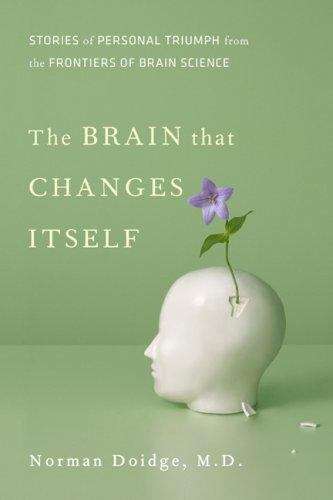The Brain That Changes Itself: Stories of Personal Triumph from the Frontiers of Brain Science
By:
Sign Up Now!
Already a Member? Log In
You must be logged into Bookshare to access this title.
Learn about membership options,
or view our freely available titles.
- Synopsis
- An astonishing new science called neuroplasticity is overthrowing the centuries-old notion that the human brain is immutable, by psychiatrist and psychoanalyst, Norman Doidge, M.D., traveled the country to meet both the brilliant scientists championing neuroplasticity and the people whose lives they've transformed-people whose mental limitations or brain damage were seen as unalterable. We see a woman born with half a brain that rewired itself to work as a whole, blind people who learn to see, learning disorders cured, IQs raised, aging brains rejuvenated, stroke patients learning to speak, children with cerebral palsy learning to move with more grace, depression and anxiety disorders successfully treated, and lifelong character traits changed. Using these marvelous stories to probe mysteries of the body, emotion, love, sex, culture, and education, Dr. Doidge has written an immensely moving, inspiring book that will permanently alter the way we look at our brains, human nature, and human potential.
- Copyright:
- 2007
Book Details
- Book Quality:
- Excellent
- Book Size:
- 434 Pages
- ISBN-13:
- 9780670038305
- Publisher:
- Penguin Group (USA) Incorporated
- Date of Addition:
- 03/09/09
- Copyrighted By:
- Norman Doidge
- Adult content:
- No
- Language:
- English
- Has Image Descriptions:
- No
- Categories:
- Nonfiction, Science, Disability-Related, Health, Mind and Body, Medicine
- Submitted By:
- Kari G
- Proofread By:
- mary stephens
- Usage Restrictions:
- This is a copyrighted book.
Reviews
5 out of 5
By Peter Wright on Oct 10, 2012
Neuroplasticity: The concept that the brain “can change its own structure and function through thought and activity.” Don’t pick up this book unless you have nothing to do for the rest of the day. I know that you’ve read that before in book reviews, but the power of that message distinctly applies to Doidge’s book. You will quickly become engaged in this intensely compelling read about neuroplastic “miracles.” The beauty here is the combination of “stories of personal triumph from the frontiers of brain science” and valid and current brain science information that clearly supports the existence of neuroplasticity. Doidge carefully tells us how that knowledge has been applied in each case. Early pioneers in neuroplasticity are also highlighted for their revolutionary contributions. One would be wise to remember that each person’s brain is different, yet the stories demonstrate the application of scientific research and principles to the lives of ordinary citizens who have experienced truly extraordinary gifts of life. The book also discusses the “painful dark side of neuroplasticity” where it can be seen as a curse. I am using this book most successfully in undergraduate and graduate courses in Educational Psychology. Some students have found it to be the most engaging reading in the course. Not only does your brain change in response to interaction with the environment, your fund of knowledge about this phenomenon can’t help but increase. Peter L. Wright, Ed.D. Assistant Professor of Education Trinity International University Deerfield, IL 60015
Other Books
- by Norman Doidge
- in Nonfiction
- in Science
- in Disability-Related
- in Health, Mind and Body
- in Medicine
